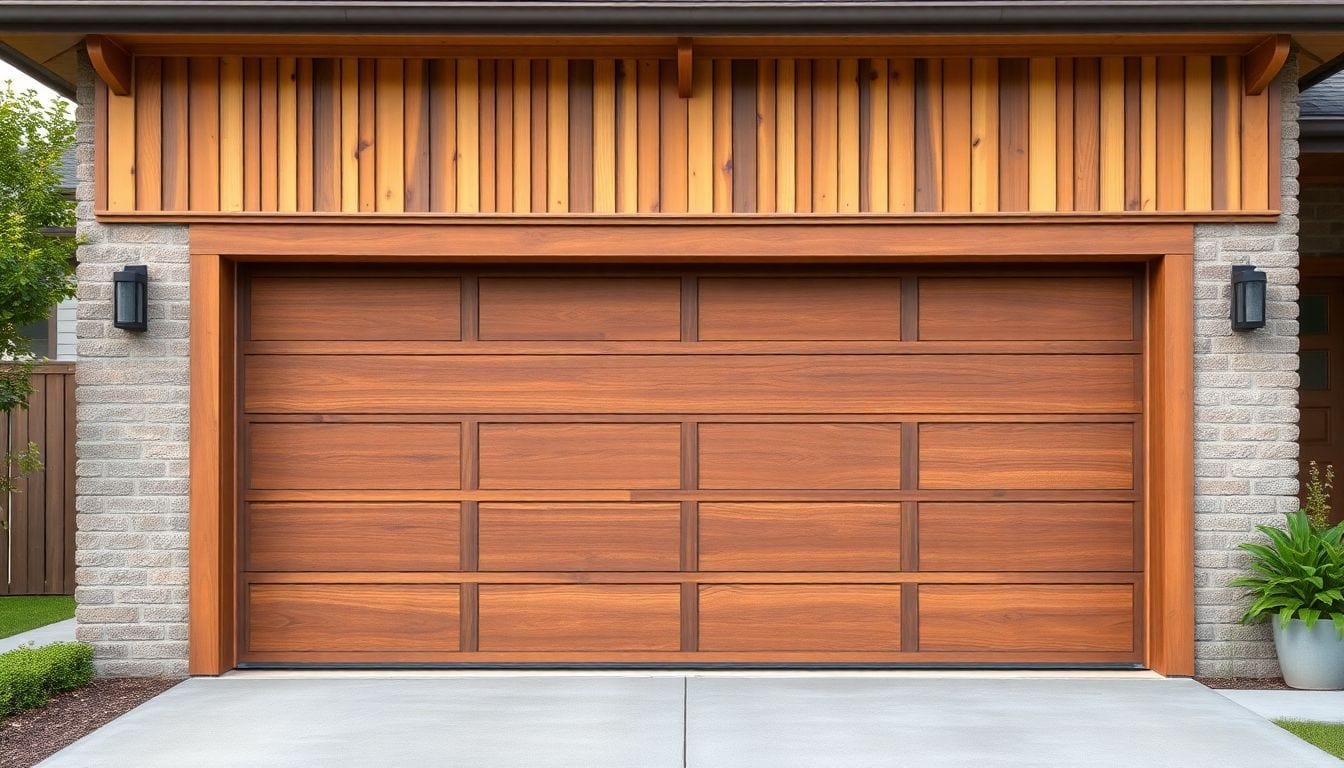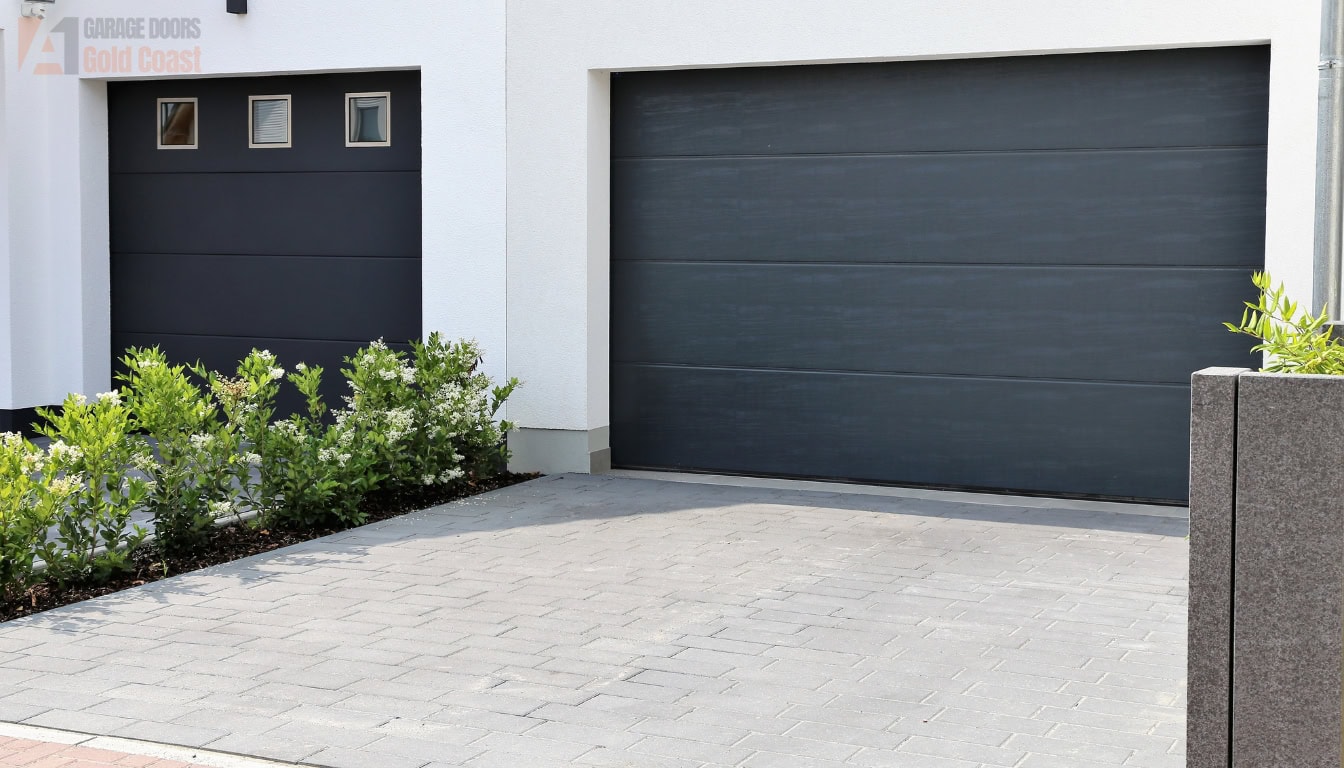Eco-Friendly Garage Doors: Insulate Your Garage with Sustainable Materials
Is your garage drafty and increasing your energy bills? Eco-friendly garage doors can help reduce energy consumption while enhancing your home’s sustainability. This article explores sustainable materials and insulation methods to make your garage more energy-efficient.
Discover how to choose the best eco-friendly garage door for your home today.
Key Takeaways
- Save on Energy Bills: Eco-friendly garage doors reduce energy loss by up to 18% with an R-value of 1.53 m².K/W, lowering heating and cooling costs.
- Sustainable Materials: Choose from timber like Red-Mahogany and Australian Beech, recyclable steel, or composite doors made from recycled materials to reduce your carbon footprint.
- Durable and Low-Maintenance: These doors withstand harsh weather, last longer, and require minimal upkeep, ensuring long-term savings and reliability.
- Noise Reduction: Insulated garage doors can decrease noise by up to 75%, creating a quieter and more comfortable home environment.
- Local Support: Opting for Australian-made products supports local manufacturing and reduces the environmental impact of long-distance transportation.
Benefits of Eco-Friendly Garage Doors

Eco-friendly garage doors offer significant energy efficiency benefits. Insulated sectional garage doors can reduce energy loss, helping to maintain the temperature inside your garage.
This insulation lowers your energy costs by minimising the need for heating and cooling. Furthermore, these doors are crafted from sustainable materials, such as timber and recycled metals, which lessen your carbon footprint and contribute to a more sustainable home.
Supporting Australian-made products also means backing local manufacturing and reducing the environmental impact associated with long-distance transportation.
Durable and low-maintenance, eco-friendly garage doors provide long-term savings and reliability. They are designed to withstand various weather conditions, ensuring longevity and reducing the need for frequent replacements.
By choosing an energy-efficient garage door, homeowners can enhance their home’s overall energy efficiency and enjoy quieter environments, as insulated doors can decrease noise by up to 75%.
Investing in an eco-friendly garage door benefits the environment and brings tangible savings and comfort to your home.
Explore the sustainable materials that make these garage doors both functional and environmentally responsible.
Sustainable Materials for Garage Doors
Choosing the right materials for your garage door is crucial for sustainability. These options help protect the environment and improve your home’s efficiency.
- Wood: Wooden garage doors provide a classic timber look using eco-friendly materials like Essence by UniCote® LUX Red-Mahogany, Victorian Ash, and Australian Beech. They offer natural insulation, reducing the need for extra heating and cooling.
- Steel: Roller garage doors made from Colorbond® steel are strong and recyclable. Steel doors feature custom colour matching and tough weather seals, ensuring durability and a long lifespan. They also enhance thermal resistance with an R-value of 1.53m².K/W, boosting energy efficiency by 18%.
- Composite: Composite garage doors are crafted from recycled materials, combining the beauty of wood with the strength of steel. These doors require low maintenance and provide excellent thermal insulation, helping to lower energy consumption in your home.
Types of Eco-Friendly Garage Doors
Explore the various eco-friendly garage door materials available, making it easier to choose an insulated garage door that fits your sustainable home—read on to learn more.
Wooden Garage Doors
Wooden garage doors provide a renewable and stylish option among different garage door materials. Made from sustainable sources, they enhance the look of any home while supporting eco-friendly living.
These doors feature a natural wood grain that adds warmth and character, making them a popular choice for environmentally friendly homes.
However, wood garage doors require more maintenance compared to other materials. Regular upkeep, such as painting and sealing, is necessary to protect them from the elements. Investing time in maintenance ensures that your insulated garage door remains durable and maintains its energy efficiency.
Choosing a wood garage door is a great way to combine beauty with sustainability, says Emma Thompson, a residential garage doors specialist.
Metal Garage Doors
Metal garage doors offer exceptional durability and require minimal maintenance. These doors can withstand harsh weather, ensuring they last for many years with little upkeep. Made from recyclable materials like aluminium and steel, metal garage doors support recycling efforts and help reduce your carbon footprint.
Since 1956, B&D roller doors have been a symbol of quality and reliability, making metal garage doors one of the best garage door options available. Their sturdy construction also improves garage door insulation, enhancing your home’s energy efficiency.
Next, explore the variety of composite garage doors available for sustainable living.
Composite Garage Doors
Composite garage doors offer a sustainable choice for homeowners aiming to reduce their ecological footprint. Made from recycled materials and three-layer, high-density polyurethane, these doors provide excellent insulation, enhancing the garage’s R-value.
This high R-value minimises heat transfer, supporting energy conservation and improving your home’s energy efficiency. Moreover, composite doors feature noise-cancelling technology that can reduce noise by up to 75%, creating a quieter environment.
With a wide range of styles and finishes available in Melbourne and Sydney, composite garage doors combine functionality with aesthetics, making them an ideal option for an eco-friendly home.
Importance of Proper Insulation
Proper insulation in your garage door enhances the energy efficiency of your garage. Insulated sectional garage doors use three layers of high-density polyurethane panelling, achieving an R-value of 1.53 m².K/W.
This 18% increase in effectiveness helps maintain the garage’s temperature, reducing the need for heating, ventilation, and air conditioning. Efficient energy use lowers energy consumption, leading to significant energy savings and a smaller carbon footprint.
Moreover, the 30,000 spring cycle ensures the door’s long-term reliability. Insulating your garage door with sustainable materials reduces your environmental impact and supports resource conservation.
Next, we will explore how to enhance energy efficiency further.
Enhancing Energy Efficiency
Enhancing energy efficiency with an eco-friendly garage door can significantly lower your energy consumption. High R-value insulation in garage doors maintains a stable temperature inside the garage.
This insulation reduces the need for extra heating or cooling, saving money and cutting greenhouse gas emissions. Insulated sectional garage doors also decrease noise by up to 75%, making your home more comfortable.
Selecting doors made from sustainable materials, such as metal or composite, ensures durability and lowers your environmental footprint. These features improve your home’s energy efficiency while supporting sustainable development.
Cladding Options for Eco-Friendly Garage Doors
Cladding your garage door with eco-friendly materials enhances both sustainability and insulation. Choose from various options that blend style with environmental responsibility.
- Timber-Look Finishes: The Essence by UniCote® LUX series offers finishes such as Red-Mahogany, Victorian Ash, and Australian Beech. These finishes provide the warm appearance of timber while maintaining the strength and durability of steel. Selecting these options supports sustainable forest management and reduces waste.
- Colourbond® Palette: A wide range of Colourbond® colours is available, including both standard and non-standard shades. This comprehensive colour palette allows you to customise your garage door to match your home’s exterior. Colourbond® paints are environmentally friendly and designed to last, minimising the need for frequent repainting.
- Profile Options: Choose from various profiles like Fineline, Ribline, Stanford, and Flatline. Each profile offers a unique look and can enhance the garage door’s energy efficiency. These designs are engineered to provide optimal insulation, helping to reduce energy consumption.
- Recycled Materials: Some cladding options incorporate recycled steel or other materials. Using recycled components helps manage waste and decreases the demand for new raw materials. This choice lowers your garage door’s environmental impact.
- Insulation Integration: Cladding materials often include high R-value insulation, such as foam or medium-density fibreboard. Proper insulation maintains a stable garage temperature, reducing the need for additional heating or cooling. This feature enhances the overall energy efficiency of your home.
- Sustainable Manufacturing: Many cladding options are produced through sustainable practices, ensuring minimal environmental footprint. Choosing products from companies committed to eco-friendly engineering and innovation supports ongoing research and development in sustainable home improvement.
- Durability and Maintenance: Eco-friendly cladding materials are designed to be long-lasting and require minimal maintenance. Durable finishes reduce the need for repairs or replacements, conserving resources and lowering your garage door’s lifecycle waste.
Choosing the Right Eco-Friendly Garage Door
Selecting the right eco-friendly garage door involves several important factors. Ensure your choice aligns with sustainability and meets your garage’s specific needs.
- Determine Size Requirements
Measure your garage space carefully. Ensure the door does not exceed a height of 5100mm and a width of 6500mm. Customisation options are available to fit your space perfectly. - Choose Sustainable Materials
Select materials like wood, metal, or composite that are environmentally friendly. Doors made from recycled materials help reduce your environmental impact. - Check Insulation Value (R-value)
Ensure the garage door has a high R-value to improve building insulation. Proper insulation reduces energy consumption and enhances efficiency. - Evaluate Energy Efficiency Features
Look for doors that maintain temperature and minimise standby power usage. Energy-efficient doors lower your energy bills and support sustainable living. - Consider Disposal Services
Opt for providers that offer disposal of old garage doors for a fee. Proper waste management supports eco-friendly practices and keeps the environment clean. - Assess Garage Door Openers
Choose an energy-efficient garage door opener that supports remote operation. This ensures convenience while reducing energy usage. - Ensure Manual Operation Availability
Select a door that can be operated manually during blackouts using a red cord. This feature guarantees functionality in case of power outages. - Customisation and Installation
Take advantage of free measure and quote services to tailor the door to your requirements. Professional installation ensures your new garage door fits and operates smoothly.
Conclusion
Choosing eco-friendly garage doors benefits both your home and the planet. These doors boost energy efficiency, helping you save on power bills. Eco Garage Doors provides strong, reliable options at competitive prices with fast installation.
Select from various sustainable materials to match your style and needs. Start insulating your garage with sustainable solutions today and support a greener future.
FAQs
1. What makes a garage door eco-friendly?
Eco-friendly garage doors are made from sustainable materials like recycled steel and building insulation materials. Choosing an eco-friendly garage door ensures that your garage door supports the natural environment and addresses environmental issues by reducing resource consumption and promoting reuse.
2. How do eco-friendly garage doors enhance energy efficiency?
Eco-friendly garage doors feature a high R-value (insulation), which enhances energy efficiency. These sustainable garage doors help reduce energy consumption by keeping your garage warm in winter and cool in summer. This means less energy is needed to maintain the climate, benefiting both your wallet and the environment.
3. Can steel garage doors be environmentally friendly?
Yes, steel garage doors are typically eco-friendly. They are crafted from recycled steel, which promotes reuse and reduces consumption of new materials. Steel garage doors are durable and can also feature building insulation materials, making them a sustainable choice that minimises environmental impact.
4. What should I consider when choosing an eco-friendly garage door?
When choosing an eco-friendly garage door, consider factors like the R-value for insulation, the materials used, and the door’s durability. A wide range of eco-friendly garage doors are available, including steel options. Ensuring that your garage door has high insulation and is made from sustainable materials will enhance energy efficiency and support the natural environment.
5. How can maintaining my garage door improve its eco-friendliness?
Maintaining your garage door ensures it operates efficiently, reducing energy consumption. Regular upkeep includes checking insulation materials and ensuring the garage door remotely operates smoothly. Proper maintenance helps your garage door stand up to climate changes and continues to provide eco-friendly benefits over time.
6. Where can I find more information on eco-friendly garage doors?
Subscribe to our newsletter for the latest updates on eco-friendly garage doors. Our friendly team can help you choose from a wide range of sustainable and environmentally friendly garage doors. We provide guidance on how garage doors can also improve your home’s energy use and reduce your environmental footprint.
Swift Garage Door Repair Services
Having issues with your garage door? Call Reece at (07) 5515 0277 for swift repair services. Visit us today for expert assistance you can rely on!


